Top Rankings
Hartland-Lakeside J3 School District ranks among the top 20% of public school district in Wisconsin for:
Category
Attribute
Overall Rank
Highest overall rank (Top 5%)
Math Proficiency
Highest math proficiency (Top 1%)
Reading/Language Arts Proficiency
Highest reading/language arts proficiency (Top 5%)
Science Proficiency
Highest science proficiency (Top 5%)
For the 2025 school year, there is 1 public preschool serving 447 students in Hartland-Lakeside J3 School District.
Public Preschools in Hartland-Lakeside J3 School District have a diversity score of 0.24, which is less than the Wisconsin public preschool average of 0.58.
Minority enrollment is 13% of the student body (majority Hispanic), which is less than the Wisconsin public preschool average of 38% (majority Hispanic and Black).
Overview
This School District
This State (WI)
# Schools
3 Schools
1,032 Schools
# Students
1,108 Students
339,535 Students
# Teachers
76 Teachers
24,694 Teachers
Student : Teacher Ratio
15:1
15:1
District Rank
Hartland-Lakeside J3 School District, which is ranked within the top 5% of all 444 school districts in Wisconsin (based off of combined math and reading proficiency testing data) for the 2021-2022 school year.
Overall District Rank
#10 out of 450 school districts
(Top 5%)
(Top 5%)
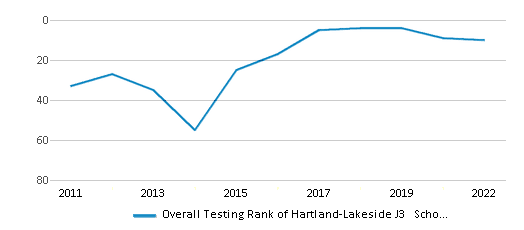
Math Test Scores (% Proficient)
75%
39%
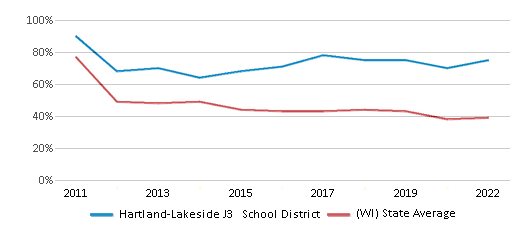
Reading/Language Arts Test Scores (% Proficient)
65%
38%
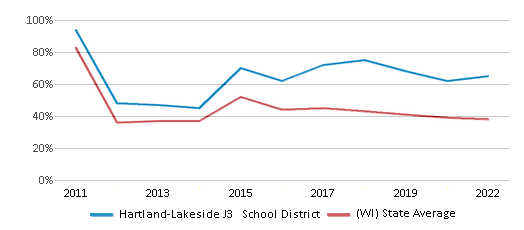
Science Test Scores (% Proficient)
77%
44%
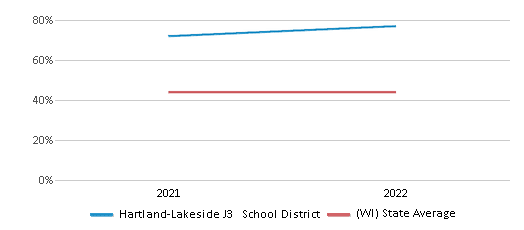
Students by Ethnicity:
Diversity Score
0.27
0.58
# American Indian Students
n/a
3,435 Students
% American Indian Students
n/a
1%
# Asian Students
27 Students
15,647 Students
% Asian Students
2%
5%
# Hispanic Students
76 Students
52,197 Students
% Hispanic Students
7%
15%
# Black Students
11 Students
39,149 Students
% Black Students
1%
11%
# White Students
944 Students
209,143 Students
% White Students
85%
62%
# Hawaiian Students
n/a
297 Students
% Hawaiian Students
n/a
n/a
# Two or more races Students
50 Students
19,658 Students
% of Two or more races Students
5%
6%
Students by Grade:
# Students in PK Grade:
111
50,321
# Students in K Grade:
104
44,890
# Students in 1st Grade:
118
45,508
# Students in 2nd Grade:
114
45,837
# Students in 3rd Grade:
119
43,291
# Students in 4th Grade:
101
42,370
# Students in 5th Grade:
111
35,557
# Students in 6th Grade:
112
11,124
# Students in 7th Grade:
115
7,438
# Students in 8th Grade:
103
7,747
# Students in 9th Grade:
-
1,444
# Students in 10th Grade:
-
1,335
# Students in 11th Grade:
-
1,345
# Students in 12th Grade:
-
1,328
# Ungraded Students:
-
-
District Revenue and Spending
The revenue/student of $15,344 in this school district is less than the state median of $17,039. The school district revenue/student has stayed relatively flat over four school years.
The school district's spending/student of $14,791 is less than the state median of $17,011. The school district spending/student has stayed relatively flat over four school years.
Total Revenue
$17 MM
$13,869 MM
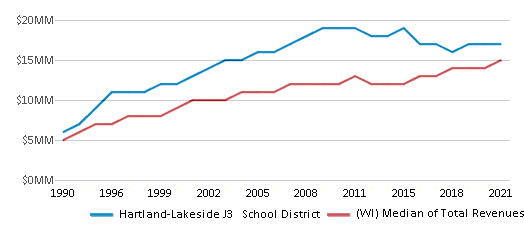
Spending
$16 MM
$13,846 MM
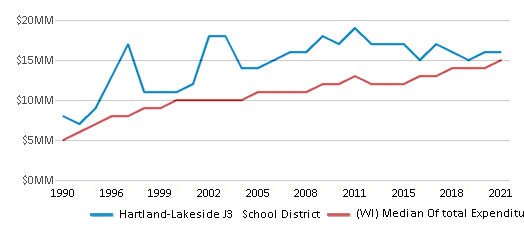
Revenue / Student
$15,344
$17,039
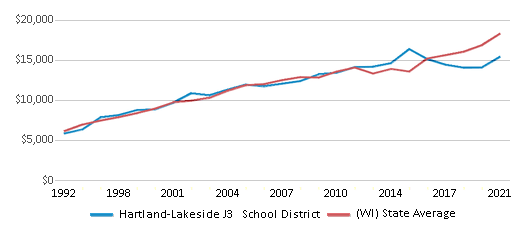
Spending / Student
$14,791
$17,011
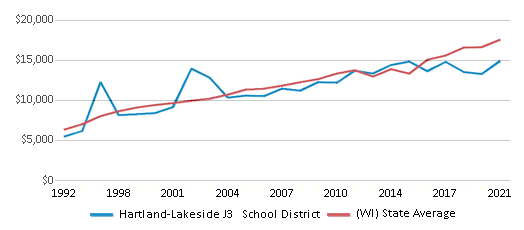
Best Hartland-Lakeside J3 School District Public Preschools (2025)
School
(Math and Reading Proficiency)
(Math and Reading Proficiency)
Location
Grades
Students
Rank: n/an/a
232 Church St
Hartland, WI 53029
(262) 369-6710
Hartland, WI 53029
(262) 369-6710
Grades: PK-2
| 447 students
Recent Articles

Sexual Harassment at Age 6: The Tale of a First Grade Suspension
A six-year old in Aurora, Colorado, was suspended after singing an LMFAO song to a little girl in his class and reportedly “shaking his booty.” We look at the case and the sexual harassment problem in public schools today.

How Scaffolding Could Change the Way Your Child Learns
This article explores the concept of instructional scaffolding, a teaching method that enhances learning by breaking down complex tasks into manageable parts. It highlights how scaffolding supports students in developing critical thinking skills and becoming more independent learners. The article discusses the benefits of scaffolding, including improved engagement and reduced anxiety, and provides strategies for its implementation across various educational levels.

February 05, 2025
Understanding the U.S. Department of Education: Structure, Impact, and EvolutionWe explore how the Department of Education shapes American education, from its cabinet-level leadership to its impact on millions of students, written for general audiences seeking clarity on this vital institution.





